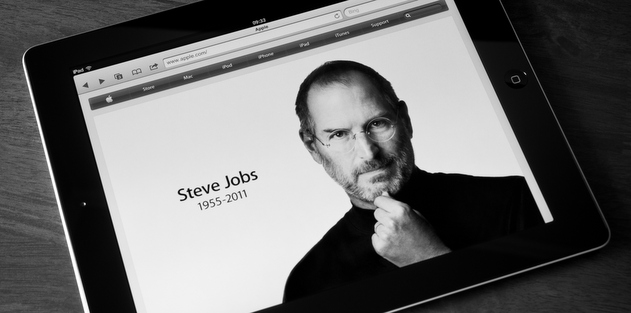Profiles In Exceptionalism: Steve Jobs
He “gave back” by creating by RICHARD LORENC.
This week, I’m beginning a new series that will profile exceptional individuals. The criteria for being an exceptional individual is simple: The person will have changed the way people think and behave purely through persuasion. Thus, no one who ever occupied an official post in government will qualify.
The first in this series is Steve Jobs. Jobs died in October 2011 after a long struggle with pancreatic cancer. Walter Issacson’s biography on him became available shortly after Jobs’s death and became the best-selling book of 2011, destined to become a classic in biographical work.
People obviously like Steve Jobs, but why?
Why would everyone from Larry Ellison – Jobs’s friend and the billionaire boss of Oracle – to teenaged Occupy Wall Street protestors idolize a man who, by most accounts, was not the most congenial fellow? After all, his biggest accomplishment, some say, was making computers prettier.
The answer lies in Jobs’s story.
Jobs’s life experience mirrored what comparative religions scholar Joseph Campbell called the “monomyth” The monomyth idea outlines three major choices a potential hero must undertake. He must first leave his familiar world, then claim victory over immensely powerful (often supernatural) forces, and finally return home to share the wisdom of his journey with others.
After growing up in the apricot orchards of what’s now called Silicon Valley, the teenaged Jobs left that world for India, half a world distant. There, over several months, he encountered and experimented with new ideas, including Zen Buddhism.
He later credited Zen thought in the development of his design philosophy: “The main thing I’ve learned is intuition, that the people in India are not just pure rational thinkers, that the great spiritual ones also have an intuition.”
In India, Jobs obviously did not battle physical demons, but spent his time there addressing some personal ones. He then chose to return to begin to share a unique vision of how technology could enrich people’s human relationships.
Like most successful entrepreneurs, Jobs was extremely tenacious. After forming Apple Computer with Steve Wozniak, he found it wasn’t easy to convince people that they should have a computer at home. In fact, I’ve heard that if you were to ask most people in the early 1970s whether there would ever be such a thing as a “personal computer industry,” they would laugh in disbelief.
But Jobs had a vision for how the computer could become a useful, beautiful, and extremely personal tool for every person to use to communicate with others.
His Indian sojourn wouldn’t be the last time Jobs would leave the familiar to slay dragons. He was kicked out of Apple shortly after debuting the Macintosh personal computer, emerging a few months later with a new company called NeXT. After NeXT failed to catch on, he returned to Apple as a consultant, taking the position of “iCEO” (interim CEO) until becoming the company’s permanent CEO a couple years later.
During all of this, he also set Pixar on the road to become the world’s preeminent computer animated film company.
Each of these appearances and withdrawals, like his time in India, marks a different adventure Jobs undertook. And each ended with his sharing with the world the insights he gleaned.
But it wasn’t always easy.
You can imagine (or even remember) what people might have said at various points throughout Jobs’s career:
“No one needs a computer in their home.”
“I’d shut [Apple] down and give the money back to the shareholders” (Michael Dell actually said this in 1997.)
“No one will see a film without live actors.”
“Who wants 1000 songs in their pocket?”
“The iPad is just a big iPod touch. Also, it has a stupid name.”
(That last thought hurt Jobs deeply. It had forever been his vision to create a beautiful, useable computer that the user would love to touch.)
Amidst the naysayers, Jobs created products that people never before knew they wanted. Some would even say today they “need” Apple’s computers, phones, and software.
Jobs also demonstrated another exceptional characteristic among high-profile business leaders: He was content to allow Apple’s record of employing thousands and serving millions speak for itself.
Unlike other wealthy businesspeople, Jobs never felt it was important to make a show of his philanthropic or civic works. Under his leadership, Apple didn’t match employees’ charitable contributions, and never attached its name to nonprofit efforts.
Jobs “gave back” by making.
I’m certain Jobs contributed to his chosen causes – competition in schooling, for example – privately. By choosing not to match his employees’ gifts, however, he made a subtle point that charity must be given entirely freely or it is no charity at all.
Perhaps that was another insight he gleaned in India or on another adventure.
His biggest insight, I think, relates to a long perspective on life, which he communicated beautifully:
When you grow up you tend to get told the world is the way it is and you’re life is just to live your life inside the world. Try not to bash into the walls too much. Try to have a nice family, have fun, save a little money.
That’s a very limited life. Life can be much broader once you discover one simple fact: Everything around you that you call life was made up by people that were no smarter than you and you can change it, you can influence it, you can build your own things that other people can use.
Once you learn that, you’ll never be the same again.

ABOUT RICHARD LORENC
Richard N. Lorenc is FEE’s chief operating officer.
EDITORS NOTE: The featured image is courtesy of FEE and Shutterstock.

